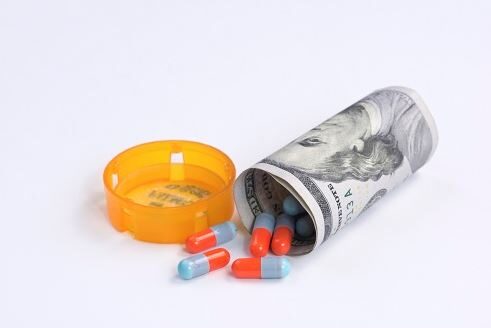© 2025 CSRXP- All Rights Reserved

DOSE OF REALITY: BIG PHARMA’S YEAR OF BAD BEHAVIOR — PART III
Dec 28, 2021
Part III: Big Pharma Maintains Price-Hiking, Patent-Gaming Business-As-Usual
Despite unprecedented attention on the crisis of prescription drug affordability, Big Pharma maintained the industry’s profits-over-people approach in 2021. From repeatedly hiking drug prices, engaging in anti-competitive tactics to undermine competition, price-gouging patients and taxpayers for unproven treatments and pushing debunked innovation rhetoric to oppose drug pricing solutions — Big Pharma had a bold year of bad behavior.
Big Pharma’s audacious approach to business-as-usual over the last year helped the industry score blockbuster profits and bank more than $1.7 trillion in cash — even as more than one-quarter of Americans faced financial uncertainty affording their medicines.
On top of this year of bad behavior, Big Pharma can be expected to maintain an annual tradition of ringing in the New Year with a fresh round of price hikes on brand name prescription drugs beginning on January 1. In the countdown to these New Year price hikes from Big Pharma (the fourth major round of Big Pharma price hikes during the COVID-19 pandemic), CSRxP’s “Dose of Reality” series will explore the egregious actions of the industry over the past year, as a reminder, that policymakers in Washington must act to hold Big Pharma accountable and lower drug prices for the American people.
Today, we take a look at Big Pharma’s latest price hikes and new analysis that examines how brand name drug companies game the system to undermine competition.
JANUARY & JULY PRICE HIKES
Big Pharma traditionally hikes prescription drug prices in two major batches each year — the first starting in January and the second starting in June. Despite the unprecedented health challenges and financial insecurity associated with the COVID-19 pandemic, Big Pharma never missed one of these major rounds of biennial price hikes – 2021 was no different.
In the first week of 2021, Big Pharma raised the list price of 822 brand name prescription drugs by an average of 4.6 percent. Included in this round of price hikes were:
- Pfizer, which hiked prices on more than 130 drugs, including its cancer treatment Ibrance and popular rheumatoid arthritis drug Xeljanz.
- GlaxoSmithKline, which raised prices on more than 30 drugs, including on its blockbuster respiratory treatments and its cancer drug Zejula.
- And Sanofi, which raised prices on more than a dozen of its drugs.
Then, in June and July 2021, Big Pharma hiked prices on 67 brand name prescription drugs by an average of 3.5 percent. Brand name pharmaceutical giants Pfizer, Sanofi, AstraZeneca, Bristol Myers Squibb, GlaxoSmithKline and Eli Lilly all participated in this latest round of summer price hikes.
BIG PHARMA’S PRICE HIKES AND PATENT ABUSE
The U.S. House Committee on Oversight and Reform released a comprehensive report in December detailing Big Pharma’s egregious pricing and anti-competitive practices. The report is the culmination of a nearly three-year investigation during which the committee reviewed more than 1.5 million pages of internal documents from pharmaceutical companies.
Upon reviewing price histories of 12 of the best-selling drugs in Medicare, the committee found prices were raised more than 250 times by Big Pharma companies using strategies that game the system and suppress competition to maintain product monopolies. These tactics include ‘product hopping’ and ‘shadow pricing’ – techniques deliberately used to shield profits from generic competition – and employing price hikes in concert with other drug manufacturers. The committee found that these 12 drugs “are now priced at a median of almost 500 percent higher than when they were brought to market.”
The companies responsible obtained more than 600 patents on the 12 drugs the committee reviewed, effectively blocking competition from more affordable alternatives for decades. In fact, the committee report states that the patents already secured for these 12 drugs “could potentially extend their monopoly periods to a combined total of nearly 300 years.”
The report estimated delayed biosimilar competition to just one drug, AbbVie’s Humira, would cost the U.S. health care system at least $19 billion from 2016 to 2023.
UNJUSTIFIED PRICE INCREASES COST U.S. PATIENTS & TAXPAYERS $1.67 BILLION
A November analysis from the Institute of Clinical and Economic Review (ICER) found that price hikes on just seven brand name prescription drugs cost American consumers $1.67 billion in 2020.
- AbbVie’s rheumatoid arthritis drug Humira – a case study in Big Pharma greed – topped the list, costing taxpayers an unsubstantiated $1.4 billion after the company increased the drug’s price 9.6 percent in 2020.
- AbbVie also hiked the price of hormone drug Lupron Depot by 5.9 percent, costing the U.S. an additional $30 million.
- Novartis raised the price of its drug Promacta, which treats low platelet levels, by 14.1 percent during the year, costing the U.S. $100 million in additional drug spending.
- And Biogen increased the price of multiple sclerosis drug Tysabri by 4.2 percent, costing the U.S. $44 million.
On the eve of Big Pharma’s next major round of pandemic price hikes, policymakers must be ready to capitalize on the unprecedented momentum for action and advance market-based solutions that hold brand name drug companies accountable in 2022.
Read more on market-based solutions to hold Big Pharma accountable HERE.
CLICK HERE to read: “Dose Of Reality” Big Pharma’s Year of Bad Behavior Part I: Price-Gouging An Unproven Treatment, Setting Out-of-Control Launch Prices.
CLICK HERE to read: “Dose Of Reality” Big Pharma’s Year of Bad Behavior Part II: Pushing Debunked Innovation Rhetoric to Oppose Rx Solutions.
